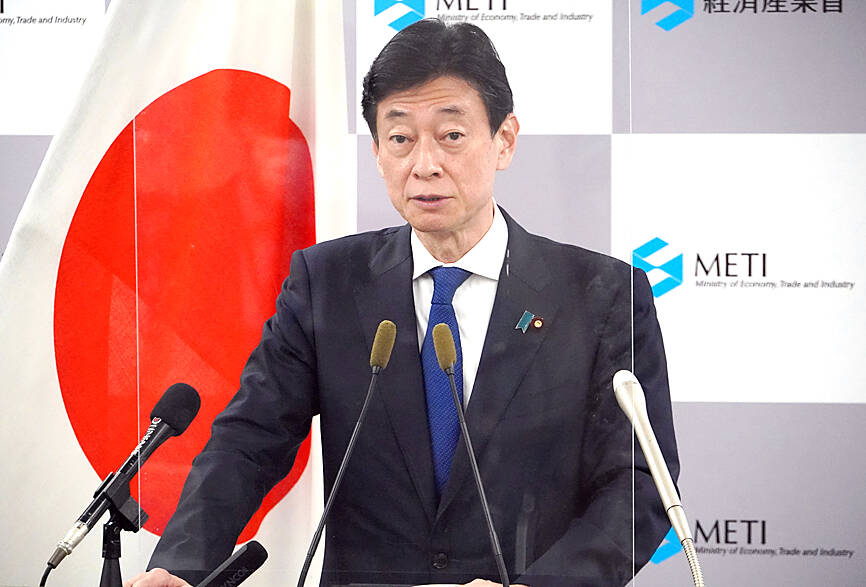Japan is investing almost half a billion US dollars to beef up semiconductor development and production in a “last chance” attempt to keep its position as a major player on the global technology stage, the government said yesterday.
The new company, Rapidus, which means “quick” in Latin, will work on developing next-generation, or “post-5G,” semiconductors, the Japanese Ministry of Economy Trade and Industry said.
These advanced chips would be used in smart gadgets and smart cities with high-speed sensors and transmission. The components have to be extremely thin — a fraction of a hair’s breadth.

Photo: EPA-EFE
US COOPERATION
The ¥70 billion (US$495 million) effort would involve working closely with major Japan ally — the US — to bring together “the best and the brightest” from both nations, the ministry said in a statement.
Japan has long prided itself on being a technological powerhouse, including in chip production, but the ministry yesterday said that the nation had fallen 10 years behind the global competition, including Taiwan, the US, South Korea and some European nations.
Now was “Japan’s last chance” to remain a player in the sector, it said.
The COVID-19 lockdowns in China have brought to light Japan’s dependence on other nations for computer chips and other key components. Analysts say the uncertain future of US-China relations, which could put supplies from China at risk, adds to the growing concerns.
However, the change will take time. Japan is aiming for mass production of the chips by the late 2020s, or within several years, the ministry said.
INVESTORS
Those taking part in Rapidus are automaker Toyota Motor Corp, electronics makers Sony Group Corp and NEC Corp, along with Softbank Corp, Nippon Telegraph and Telephone Corp, Denso Corp and Kioxia.
Each company is investing ¥ 1 billion, in addition to the Japanese government subsidies. An eighth company, MUFG Bank, is investing ¥ 300 million.
Next-generation chips are expected to be crucial for artificial-intelligence and automated driving systems. Investing in such technology would lead to jobs and growth, the Japanese government said.

Taiwan would remain in the same international network for carrying out cross-border payments and would not be marginalized on the world stage, despite jostling among international powers, central bank Governor Yang Chin-long (楊金龍) said yesterday. Yang made the remarks during a speech at an annual event organized by Financial Information Service Co (財金資訊), which oversees Taiwan’s banking, payment and settlement systems. “The US dollar will remain the world’s major cross-border payment tool, given its high liquidity, legality and safe-haven status,” Yang said. Russia is pushing for a new cross-border payment system and highlighted the issue during a BRICS summit in October. The existing system

Taiwan Semiconductor Manufacturing Co (TSMC, 台積電) is expected to grow its revenue by about 25 percent to a new record high next year, driven by robust demand for advanced technologies used in artificial intelligence (AI) applications and crypto mining, International Data Corp (IDC) said yesterday. That would see TSMC secure a 67 percent share of the world’s foundry market next year, from 64 percent this year, IDC senior semiconductor research manager Galen Zeng (曾冠瑋) predicted. In the broader foundry definition, TSMC would see its market share rise to 36 percent next year from 33 percent this year, he said. To address concerns

Intel Corp chief financial officer Dave Zinsner said that a formal separation of the company’s factory and product development divisions is an open question that would be decided by the chipmaker’s next leader. Zinsner, who is serving as interim co-CEO following this month’s ouster of Pat Gelsinger, made the remarks on Thursday at the Barclays technology conference in San Francisco alongside co-CEO Michelle Johnston Holthaus. Intel’s struggles to keep pace with rivals — along with its deteriorating financial condition — have spurred speculation that the next CEO would make dramatic changes. That has included talk of a split of the company’s manufacturing

PROTECTIONISM: The tariffs would go into effect on Jan. 1 and are meant to protect the US’ clean energy sector from unfair Chinese practices, the US trade chief said US President Joe Biden’s administration plans to raise tariffs on solar wafers, polysilicon and some tungsten products from China to protect US clean energy businesses. The notice from the Office of US Trade Representative (USTR) said tariffs on Chinese-made solar wafers and polysilicon would rise to 50 percent from 25 percent and duties on certain tungsten products would increase from zero to 25 percent, effective on Jan. 1, following a review of Chinese trade practices under Section 301 of the US Trade Act of 1974. The decision followed a public comment period after the USTR said in September that it was considering